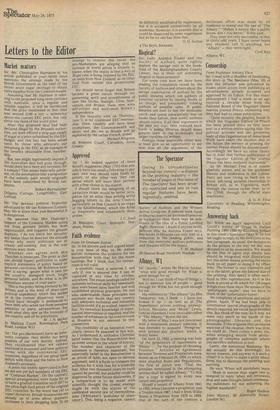Market matters
Mr. Christopher Harrisson in his article published in your latest issue mentions the attempt made by the British Government at the time of the recent acute sugar shortage to obtain extra supplies from the Commonwealth. Assuming that Mr Harrison is referring to the proposed long-term contract With Australia, once a regular and reliable supplier, it will be recollected that the price mentioned at that time was around £180 a ton — somewhat above the current EEC price, but only about one third of the world price.
After this proposed deal had been declared illegal by the Brussels authorities, we were offered a stop-gap supply of sugar at a price subsidised by the EEC budget, and this fact has been seized upon by those who advocate our remaining in the EEC as an example of the benefits obtainable from membership.
But, one might legitimately inquire, if the Australian deal had gone through, would there have been any necessity for a subsidy? This seems especially pertinent, on the assumption that a proportion of the subsidy paid would originally have been subscribed by British taxPayers.
Robert Bairnsfat her Delgany Cottage, Longmiddry, East Lothian
Sir: The devious political hypocrisy advocated by Mr Ian Robinson (Letters, May 10) is more than just distasteful; it is dangerous. He assumes that Mrs Thatcher's support of the Common Market stems not from genuine beliefs but from oPPortunfsm, and suggests yet greater duplicity. I do not know her sincerity any better than he does. but the attitude shows why many politicans are so crassly self-seeking: that is the way electors want them.
Whetherone agrees with Mrs Thatcher is irrelevant. The point is that one should expect politicians to make explicit statements of policy based on personal conviction. Mr Robinson however is saying: ignore what is best for the country, disregard truth, forget Personal beliefs, and do what is in the immediate interest of your party. This is the policy being pursued by Mr Wilson and is the kind of short-term Political expediency which has landed U5 in the current disastrous mess. I would have thought it preferable to have MPs who acted not from personal ambition or party advancement but from what they saw as the interests of the country and all its population.
M. I. H. Becket 31 Matlock Court, Kensington Park Road, London W11
Sir: The pro-Marketeers have an inferiority complex: they dislike our being masters of our own destiny. Instead, they recommend that we remain entwined in economic and later political terms with the continental EEC countries, regardless of our penal trade deficit with them and the harm to New Zealand's economy. A point not widely appreciated is that we are not yet full members of the EEC or "Common Market". On the contrary, Special arrangements were made for us to have a gradual transition until 1977 to the ultra-high food prices of the original EEC countries. So the worst has yet to come! However, British housewives are already up •in arms about dramatic increases in their shopping bills. In an
attempt to counter this revolt, the pro-Marketeers are alleging that an increase in world prices is entirely to blame, when the reality is that a levy of 20 per cent is being imposed by the EEC on lamb from New Zealand, as on other food from outside this protectionist EEC. We should never forget that Britain became a great nation through the pioneering spirit and inventiveness of men like Drake, Raleigh, Clive, Stevvenson and Brunel: these men were self-reliant and welcomed Britain's independence.
If the majority vote on Thursday, June 5, is for continued EEC membership, them timidity will have been triumphant; the Commonwealth will decay and die, we in Britain will be exploited by the unfair French, alone! Michael Kingston 43 Western Court, Clevedon, Avon County


























 Previous page
Previous page